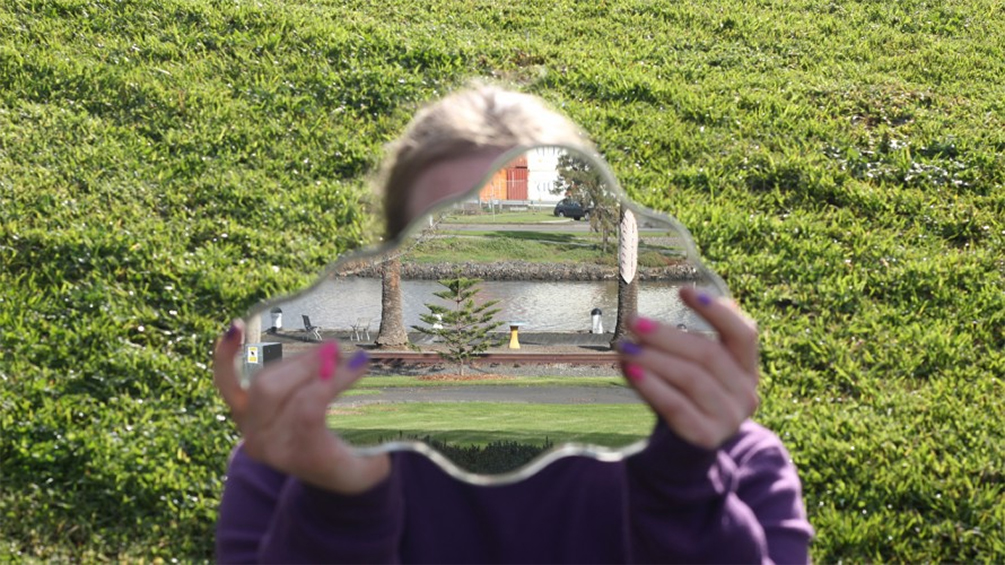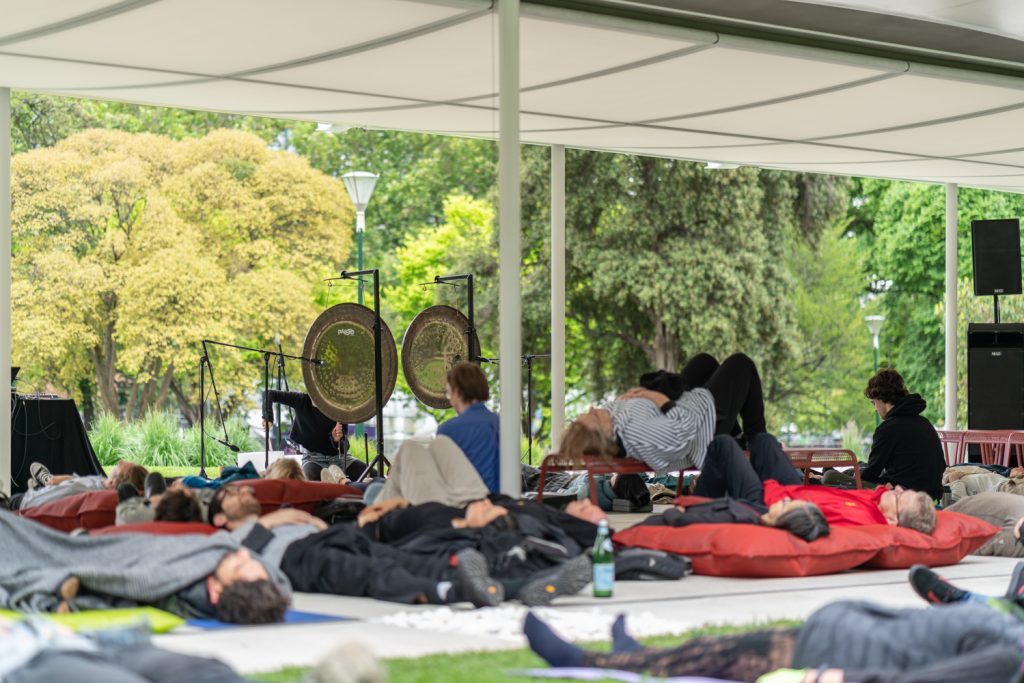MPavilion Podcasts for Finding Calm and Inspiration

We’ve enjoyed five action-packed months under the wing of Glenn Murcutt’s pavilion. Now that the season has ended and the pavilion is packed away, we’re taking some time to look back and reflect upon past seasons, rifle through archives, and revisit past talks.
Until we re-open in November 2020, we’ll be sharing a podcast each week on our socials, so be sure to follow us on Instagram and Facebook for your weekly dose of MPavilion. From tackling perfectionism, to meditating on mysteries of the mind, we hope that you can listen in and feel connected and uplifted.
Don’t forget that you can find a regularly updated archive of recordings of talks and readings from the first MPavilion season in 2014 to present at library.mpavilion.org. So if you missed an event, you can visit—or revisit—all of our leading discussions in one place.
What happens when we stop—if we push a symbolic pause button on our lives? How is pause used as a diplomatic moment, a break in verse, a strategic instrument, a historical atonement or a connection to place?
This ever-relevant MTalk, presented as a part of our 2016 season, invites us to reflect on our past lives, imagined lives and future lives, and consider the environment and the surroundings we are in. In this wide-ranging conversation, panellists explored the significance of pause in creative practice, techniques of mindfulness, and how a break from life can result in a total reassessment and recalibration.
MTalks—School of Life presents The Wisdom of Mind Sciences
Being human is not always easy. For centuries the mind sciences have attempted to unlock the mysteries of why some people live a life of quiet despair while others flourish. In this fascinating MTalk from the 2015 MPavilion season, Dr Jo Mitchell explains how the wisdom of key thinkers from the mind sciences might help us to live well in everyday life.

Image by Anthony Richardson
MTalks—Nothing Happening: A Symposium on Nothingness
Productivity guilt got you spiralling? Perhaps it’s time to take a step back and appreciate the simple pleasure of doing nothing at all. In this 2017 MTalk, leading academics, thinkers, and experimental artists explored the concept of nothingness in scientific inquiry, sustainability, literature and different cultures around the world. This wide-ranging conversation traverses disciplines and eras – from international law to human rights, Shakespeare to physics, learn how the idea of ‘nothingness’ affects everything we do.
One of the uniting aspects of humanity is storytelling. Presented as a part of our 2018 season, ‘Foreground’ brought conversations and storytelling that is usually in the background to the foreground at MPavillion—mapping the intersection between spoken-word, poetry, sound, movement and discussion. In this performance and discussion, the collective of artists used ritual and space to alchemise history and experience through collective storytelling.

Image by Lucy McRae
MTalks—Perfectionisms: ‘Pressure to be Perfect’
Is perfectionism an asset or a barrier? Join an intriguing discussion from our 2018 season, presented by Science Gallery Melbourne, to explore how perfectionism exists both positively and negatively across a range of different industries, from the need for precision in making the next big scientific discovery to performance anxiety in the performing arts.
MTalks—Morning Stories: N’arweet Carolyn Briggs in conversation
Dive into the rich history of the land on which MPavilion lies, the Yalukit Willam Country, with N’arweet (Elder) Carolyn Briggs as she tells powerful stories of the Boon Wurrung people, and shares her reflections on the importance of storytelling as a tool for teaching and learning. Presented as a part of our 2017 season, Carolyn was joined by former MPavilion creative director Jessie French to share stories from her childhood and community.
MTalks—Indigenous Knowledge & Nature in Our Cities
Presented by Indigenous researchers and advisory members of the National Environmental Science Program, this panel discussion explored a range of questions about the significance of nature in cities—including threatened species—for maintaining a connection to Country. Considering ways to better incorporate Indigenous values and knowledge of biodiversity into urban design and management, this dynamic conversation drew on traditional methods as a pathway to improving the liveability and conservation value of urban landscapes.

Image by Avinash Chugh
Many young people in northern India argue that to survive in the subcontinent today you need jugaad. This is a Hindi word which means “a hack”—the shrewd use of available resources to find ingenious solutions. Craig Jeffrey examined how young people in rural India think about jugaad. They value the concept – but they also argue that uncritical celebration of jugaad can let the state off the hook, because it distracts attentions from the need to improve education, healthcare, and infrastructure. Listen in to this fun and accessible talk to learn more.
MTalks—Transitioning for Survival
Join us to look back on this February MTalk on transitions, vulnerability, and navigating complex changes. We were joined by educator-artist Kate Ellis in welcoming a multi-disciplinary panel; yoga teacher Lucienne Shanti; writer and actor Candy Bowers, and Chunky Move teacher and independent dancer/choreographer Sarah Aiken. Take a seat wherever you are, and listen in on this conversation about the different streams of flux in all our lives.
Happy listening! You can access all the MPavilion podcasts via our library.mpavilion.org or via Soundcloud.